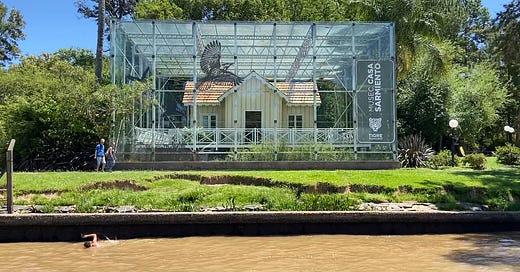“Buenos Aires can return to what it was, because European civilization is so strong there, that despite the brutalities of the government, it must be sustained.”
~ Domingo Faustino Sarmiento (1811-1888), Second President of Argentina
Joel Bowman, with today’s Note From the End of the World...
Nestled on the banks along the labyrinthine estuaries of the Paraná Delta, a half hour or so drive north of Buenos Aires, lies the sleepy bayou city of Tigre.
The name itself derives from the "tigers" (or rather jaguars) that were hunted there, on occasions, in its early years. How the times have changed...
Today, you’re more likely to be mobbed by swarms of selfie-stick wielding tourists than you are taken down by a prowling jaguar. Even so, the destination makes for a relaxing getaway from the blazing January heat in the capital.
And so, last weekend, we made the journey with family and friends...to enjoy a spot of canoeing, an unhurried lunch and some poolside cocktails for good measure.
Along the scenic river route, trafficked by traditional-styled mahogany commuter launches, lies a curious house encased in a giant glass box. The quaint structure, preserved for posterity, belonged to Argentina’s second president, Domingo Faustino Sarmiento.
Known here as the Father of Education, Sarmiento grew up as part of the revolutionary “1837 Generation,” about which we’ve written in these pages (see below.)
Once and Future Freedom
As one of 15 children, nine of whom died in their early years, Sarmiento was the only son in the family who lived until adulthood. Having grown up in poverty, the writer, public intellectual and political activist envisioned a better future for his nation, which had been given over to a state of conflict, disarray and civil war after casting off the yoke of Spanish rule in the War of Independence (1810-1818).
In his own words...
“I was born in a family that lived long years in mediocrity bordering on destitution, and which is to this day poor in every sense of the word. My father is a good man whose life has nothing remarkable except [for his] having served in subordinate positions in the War of Independence... My mother is the true figure of Christianity in its purest sense; with her, trust in Providence was always the solution to all difficulties in life.”
Six score and sixteen years since Sarmiento’s passing (he died of a heart attack, aged 77, and is buried in Recoleta Cemetery), Argentina is again undergoing a season of great change.
We wonder what the stolid statesman would think of his country today, yearning once again to breathe free, to be reborn into that state of liberty which he himself had dared envision. Can Argentina “return to what it was”? We wait and see...
Meanwhile, please enjoy our missives from the past week (plus the “1837 Generation” column from the archives) below…
Enjoy your weekend…and stay tuned for more Notes From the End of the World...
Cheers,
Joel Bowman
















Share this post